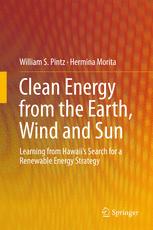

Most ebook files are in PDF format, so you can easily read them using various software such as Foxit Reader or directly on the Google Chrome browser.
Some ebook files are released by publishers in other formats such as .awz, .mobi, .epub, .fb2, etc. You may need to install specific software to read these formats on mobile/PC, such as Calibre.
Please read the tutorial at this link: https://ebookbell.com/faq
We offer FREE conversion to the popular formats you request; however, this may take some time. Therefore, right after payment, please email us, and we will try to provide the service as quickly as possible.
For some exceptional file formats or broken links (if any), please refrain from opening any disputes. Instead, email us first, and we will try to assist within a maximum of 6 hours.
EbookBell Team

5.0
38 reviewsThis book documents the socio-environmental context and early history of Hawaii's attempt to substitute renewable energy sources and energy efficiency measures for oil imports. It identifies areas of policy formulation where clean energy strategies were effective and areas where the state's policy strategy was either inappropriate or constrained by political or institutional factors.
Although Hawaii's Clean Energy Initiative is a unique partnership, formulated to meet Hawaii's specific needs and resources, the policy process addressed problems that are common outside the state. While the case study involves clean energy policies, many of the issues are applicable to public policy development topics in other sectors. Examples of these "general interest" policy topics include:
• understanding how the political and socioeconomic climate may influence policy assumptions
• formulating a regulatory and legal framework for monitoring policy compliance
• designing and understanding the implications of subsidy and tax-incentive policies
• managing conflicts with policies in other sectors;
• addressing the interests of existing and future stakeholders;
• creating strategies for public consultation and information dissemination;
• using external expertise from government agencies, academic institutions and private consultants;
• designing performance and evaluation metrics for measuring progress.
The book is intended for use in graduate and senior undergraduate courses dealing with the formulation, implementation and impact of public policy. It also provides researchers involved in the development and implementation of clean energy with a guide to the hurdles likely to be encountered in moving innovation from the technical sphere to the practical real world and how to overcome them. Professional policymakers may benefit from an example of a process to create a workable clean energy policy.